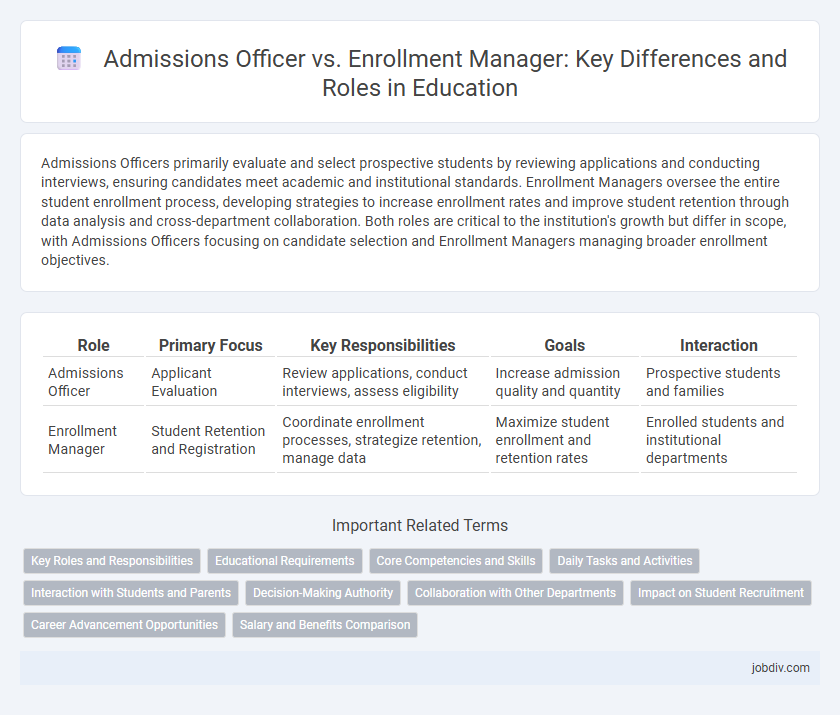Admissions Officers primarily evaluate and select prospective students by reviewing applications and conducting interviews, ensuring candidates meet academic and institutional standards. Enrollment Managers oversee the entire student enrollment process, developing strategies to increase enrollment rates and improve student retention through data analysis and cross-department collaboration. Both roles are critical to the institution's growth but differ in scope, with Admissions Officers focusing on candidate selection and Enrollment Managers managing broader enrollment objectives.
Table of Comparison
| Role | Primary Focus | Key Responsibilities | Goals | Interaction |
|---|---|---|---|---|
| Admissions Officer | Applicant Evaluation | Review applications, conduct interviews, assess eligibility | Increase admission quality and quantity | Prospective students and families |
| Enrollment Manager | Student Retention and Registration | Coordinate enrollment processes, strategize retention, manage data | Maximize student enrollment and retention rates | Enrolled students and institutional departments |
Key Roles and Responsibilities
Admissions Officers evaluate applications, interview prospective students, and coordinate recruitment events to attract qualified candidates. Enrollment Managers oversee the entire enrollment process, from strategy development to managing admissions staff and ensuring targets are met. Both roles collaborate closely to optimize student intake and maintain enrollment goals.
Educational Requirements
Admissions Officers typically require a bachelor's degree in education, communications, or a related field, emphasizing strong interpersonal and organizational skills. Enrollment Managers often hold advanced degrees such as a master's in higher education administration or business, reflecting their leadership responsibilities and strategic planning expertise. Both positions value experience in student services and knowledge of enrollment processes, but Enrollment Managers generally need more formal education to navigate complex institutional goals.
Core Competencies and Skills
Admissions Officers excel in student recruitment, application evaluation, and interpersonal communication, emphasizing relationship-building and detailed review of candidate credentials. Enrollment Managers specialize in strategic planning, data analysis, and process optimization to enhance student retention and streamline enrollment systems. Both roles require strong organizational abilities and knowledge of educational regulations, but Enrollment Managers focus more on operational efficiency while Admissions Officers prioritize direct candidate interaction.
Daily Tasks and Activities
Admissions Officers primarily focus on recruiting prospective students by conducting interviews, reviewing applications, and coordinating campus tours to communicate program benefits effectively. Enrollment Managers oversee the entire enrollment process, managing staff, analyzing admission data, and developing strategies to increase student retention and streamline registration. Both roles require strong communication skills, but Enrollment Managers emphasize strategic planning and operational efficiency to meet institutional enrollment goals.
Interaction with Students and Parents
Admissions Officers focus on guiding prospective students and parents through the application process, providing detailed information about program requirements and campus resources. Enrollment Managers oversee broader communication strategies, ensuring consistent engagement and follow-up with admitted students and their families to facilitate smooth enrollment. Both roles prioritize personalized interaction but differ in scope, with Admissions Officers concentrating on initial contact and Enrollment Managers managing ongoing relationships.
Decision-Making Authority
Admissions Officers primarily focus on evaluating student applications and making recommendations based on academic qualifications and institutional criteria. Enrollment Managers have broader decision-making authority, overseeing the entire enrollment process, including strategy development, recruitment, and retention initiatives. Their role integrates data analysis and cross-department collaboration to optimize student admission outcomes and institutional growth.
Collaboration with Other Departments
Admissions Officers collaborate closely with academic departments and marketing teams to attract and assess prospective students, ensuring alignment with institutional standards and program requirements. Enrollment Managers work with financial aid, registrar, and student services to streamline matriculation processes and enhance student retention through coordinated support systems. Both roles require effective interdepartmental communication to create a seamless recruitment-to-enrollment pipeline.
Impact on Student Recruitment
Admissions Officers focus primarily on evaluating and selecting prospective students, directly influencing the quality and diversity of the applicant pool. Enrollment Managers oversee the entire recruitment process and develop strategic initiatives to maximize student enrollment numbers and retention rates. Their combined efforts significantly impact institutional growth, shaping academic programs and resource allocation based on recruitment outcomes.
Career Advancement Opportunities
Admissions officers typically focus on evaluating applicants and managing the admissions process, which develops expertise in student recruitment and application assessment. Enrollment managers oversee the entire enrollment strategy, including retention and student services, positioning them for leadership roles in enrollment operations and institutional planning. Career advancement in this field often involves moving from admissions officer to enrollment manager, then progressing to director-level or executive roles within higher education administration.
Salary and Benefits Comparison
Admissions Officers typically earn between $45,000 and $65,000 annually, focusing on recruiting prospective students and evaluating applications, whereas Enrollment Managers command higher salaries ranging from $60,000 to $90,000 due to their broader responsibilities in overseeing enrollment strategies and team management. Benefits packages for Enrollment Managers often include comprehensive health plans, performance bonuses, and professional development opportunities, reflecting their supervisory roles and strategic impact. Salary disparities align with the scope of duties, with Enrollment Managers receiving higher compensation linked to leadership and enrollment growth outcomes in educational institutions.
Admissions Officer vs Enrollment Manager Infographic

 jobdiv.com
jobdiv.com